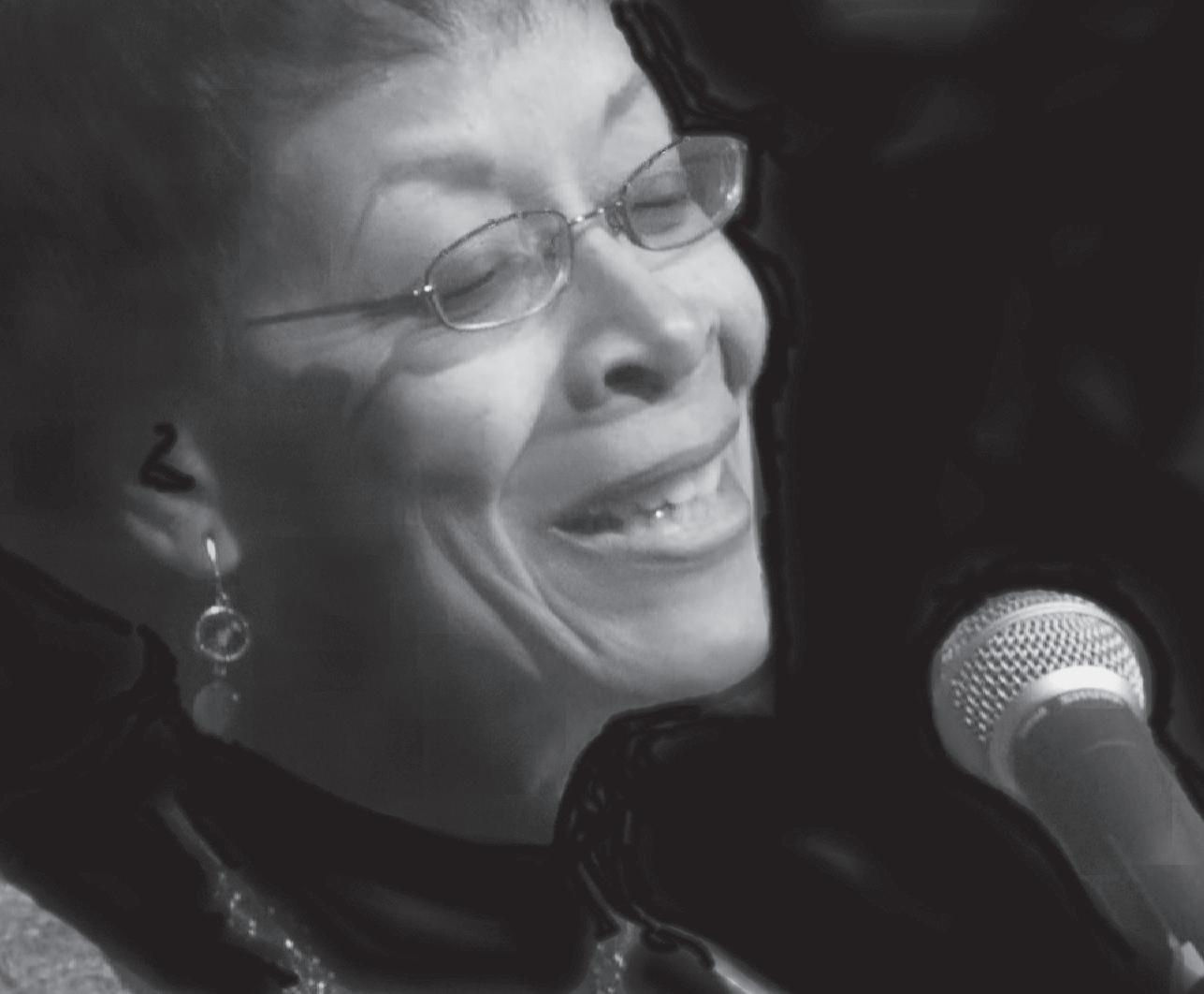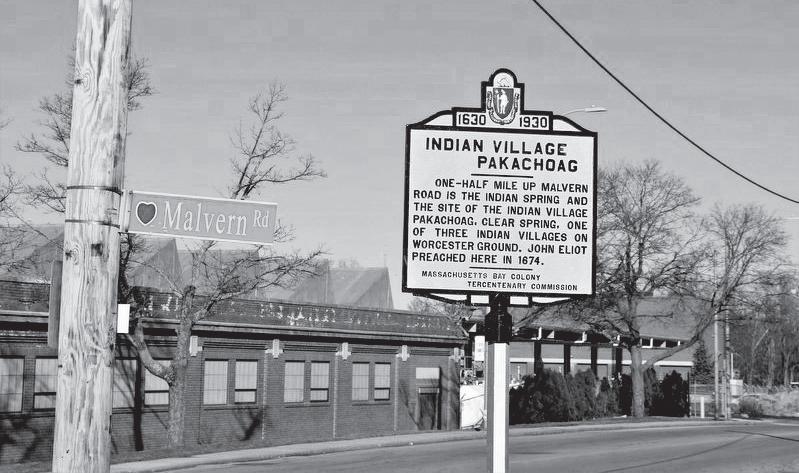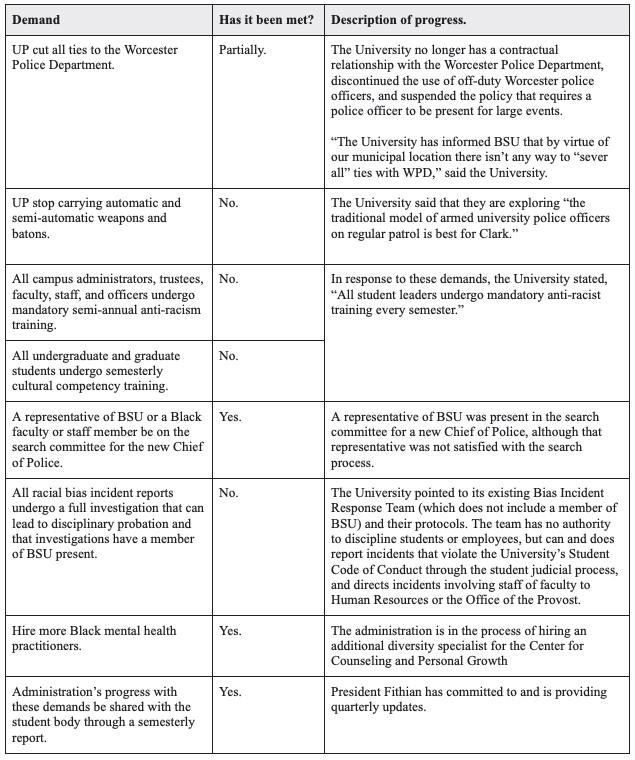
24 minute read
Featured
Lydia Fortune still singing The Blues
RICHARD DUCKETT
Advertisement
In January, a new show featuring Worcester singer-songwriter Lydia Fortune titled “Bessie, Billie and the Blues” sold out at Carter 19 in Berlin.
With Roland Ochsenbein, keyboards, Tim Fiehler, bass, and Pat “Hatrack” Gallagher, harmonica, Fortune explores the music, lives and influence of legendary blues singers Bessie Smith and Billie Holiday.
“It allows me to sing the music I really love,” Fortune said.
Things were getting rolling. Then, of course, the pandemic stalled matters.
“We’re kind of waiting on it until things blow over because we were just getting started,” Fortune said.
But although she noted that right now, “I’m just starting to get out a little bit. I’m kind of lying low,” Fortune has still been singing the blues.
That shouldn’t be a surprise since her soulful voice has been delivering not just the blues but also jazz, folk, spirituals, pop, country and more to delighted audiences in the Worcester area since the 1970s.
On Aug. 5 she did get out to the Senior Center in Worcester where Stephen A. Bourassa of the The New England Jazz Enrichment Foundation and organizer of the Worcester Jazz Festival filmed some segments from “Bessie, Billie and the Blues” that have appeared on local cable TV and video on demand. Fortune was scheduled to be back at the Worcester Senior Center Nov. 4 to record a holiday song with Bourassa’s band.
At home, she’s been working on a project with The Black Women’s Creative Group telling the real story of Bethany Veney, who was born into slavery and wrote “Aunt Betty’s Story: The Narrative of Betty Veney, A Slave Woman.” Tina E. Gaffney of the group called Fortune a storyteller through her musical work.
When it comes to music, “I call myself eclectic,” Fortune said. “I
love all of it. I’ve done all of it in Worcester.”
Fortune didn’t start out in Worcester. Her parents were from South Carolina where they were both members of choral groups. Her father was in the Army, and the family traveled the country to various postings.
Along with being from a musical family, “I listened to the radio and I really took a love to music,” Fortune said.
“I ended up in Worcester in the 1970s.”
She initially made an impression audiences here singing folk music, including for the former Summer’s World.
Lydia Fortune
SUBMITTED PHOTO
Meanwhile, Fortune helped form a local R&B band called Broken Ground and performed as an independent jazz soloist. She was also a featured vocalist for the Crown Hill Jazz Sextet and later joined Worcester jazz pianist Jim Heffernan to form the Heffernan/Fortune Trio.
In 2000, she teamed up with husband-and-wife duo Dan and Gail Hunt and they backed her as Lydia Fortune & Company on her first recording, “Songs from the Road,” which earned Fortune Best New Artist in the 2001 Worcester Wormtown Sound Awards. The CD featured 10 original songs and established her as a singer/songwriter. Her second CD, “All Over the Map” (2003), succeed in further blurring musical lines. The nine cover tunes highlighted her ability to create fresh new approaches to old tunes, while the four originals served to sharpen her songwriting skills.
From 2007-2009 Fortune was featured as a jazz vocalist with the Paul Combs Pocket Big Band.
There have been other bands, gigs and venues along the way.
In 2010 she and local guitarist Phil Nigro formed a songwriting team writing and performing original material that borrows from folk, blues and jazz. Fortune and Nigro opened for “An Evening with Dr. Maya Angelou” at The Hanover Theatre and Conservatory for the Performing Arts in 2012. Angelou acknowledged their performance as she took the stage, earning the duo a second round of enthusiastic applause.
“That was the thrill of a lifetime,” Fortune said.
She is also a former host for the John Henry’s Hammer Coffeehouse open mic series.
“I’ve been all over the city,” Fortune said. Outside of music, Fortune began her professional career serving in the Navy and later was director of multicultural studies at Clark University and is a retired professional mediator.
She’s watched the events of 2020 unfold, including calls for racial justice and the rise of Black Lives Matter countered by overt racism.
“Black Lives Matter — I understand where that’s coming from. The biggest thing is not wanting to be killed and not wanting to be disrespected,” Fortune said.
Alongside protests have come people from racist groups deliberately burning buildings or breaking windows to make it look as if these were the actions of Black Lives Matter supporters, she noted. “There are set-ups. It’s scary,” Fortune said. “What worries me now are those who set out to create a distraction.”
When she was in the Navy, “I saw organized racism from the top down,” she recalled. However, “the racial tension in the country is growing. It’s been an underlying thing that’s been growing since the ’80s.”
In the 1990s she saw increasing images of Black people in films “being perceived as thugs.” Some people told Fortune it was a way for an actor to make a living, but “I pay attention to what people say and do.”
In Worcester, “It’s a real mixed bag,” she said. “I think things were kind of getting better in terms of connecting with kids.”
Racism can come in many forms. Fortune knows of one regular at John Henry’s Hammer who was targeted in a violent act unrelated to the coffeehouse because he was Jewish.
Not too long ago, Fortune said, she inadvertently drove through a red light and the police officer who stopped her was pleasant enough about it, telling her to “pay attention next time.” But in the 1990s, Fortune remembers driving the wrong way down a one-way street and “an officer chased me and got out of his car with his hand on his gun.” His manner was very confrontational. “He just wanted to egg me on,” Fortune said.
Still, in Worcester, “I feel safer than I would in other places. I’m glad I’m living here, but I know that there is racism,” Fortune said.
“I feel unsafe with people that are looking for trouble. But I’m old so people leave me alone.”
Returning to the subject of her musical career, Fortune was asked if she had ever wanted to make singing a full-time professional endeavor.
“I think about it. My issue is I feel music. I don’t really read it,” she said.
“In some bands we had some promoters, but generally they’d get on my nerves. I was in an R&B band doing pretty good. We were doing some jazz and we had two singers.” But a promoter “wanted us to wear these slinky gowns.” This idea did not sit well with Fortune. She told the promoter, “I’m here to provide my music. I’m not here to provide my body. Why don’t you wear one?” That ended the conversation. “I’m a little bit too independent. So that was that,” she said.
She didn’t like arguing about it, however. “I was a professional mediator. I help people resolve fights without getting into them. I was just too shy to go after anything professional.” With that, Worcester has been a good place to be for an eclectic singer-songwriter who is still singing and collaborating.
“Worcester has such a fantastic music community. I know a lot of musicians from different genres,” Fortune said.
It was Ochsenbein, a well-known area keyboardist, who approached Fortune about putting together what has become “Bessie, Billie and the Blues.”
“Roland said ‘How would you like to do a show with me?’ and I just jumped at it,” Fortune said.
Thanksgiving DinnerTh ing Dinn


$ 5.00 Serves Approx. 10-12 people •OneFresh24-26lb.Turkey•HouseMadeWhippedRussetPotatoes • NewEnglandWhippedButternutSquash•HouseMadeSageStuffing • Broccoli Cheese Casserole • Cranberry Sauce • Turkey Gravy • 10” Apple Crumb Pie • One 10” Pumpkin Pie
All orders mus and picked up t be placed by between 10-2 Nov. 18th Wednesday Nov. 25th Order your CorporateThanksgivingDinner $16.95pp•Min.20ppl HotCorporateCateringSpecials fresh baked PIES today!


Seafood $450 PearChicken $400 PumpkinChicken $400
HoneyMapleOrange FigandFontinaProscuitto PumpkinDate&Pecan
Salmon PearStuffedChicken StuffedChicken
Napoli Italian Deli & Catering WM-0000450981-02 508-798-7999 check our website for daily and addiional Fall A catering specials www.napolideli.com
Low auto
2.50% APR refinancing available! *

If you’remaking auto payments on amodel year 2016–2021, now’s the time to refinance. At MCU, we’reoffering rates as low as 2.50% APR.* That means lots of extra cash—for your foliage road trip!
*APR of 2.50%for 2016 –2021 model years, up to 72 monthsfinancing.Rate applicable with automatic loan payments from MCU’sPremium or Optimum checking accounts. New loans to MCU only; rate and terms aresubject to change. Your Community Credit Union!
millburycu.com | 508-865-7600 | @#MCU Auburn | Millbury | South Grafton | Worcester
AUTOMOTIVE REPAIRS & SERVICE
- Brakes & Shocks - Engine Diagnostics - Radiator Service - Suspension Repair - Muffler & Exhaust - A/C Diagnostic & Repair - Electrical Diagnostics - Emission Repairs

Holy Cross examines its foundations built on Native American settlement
VEER MUDAMBI
With the 400th anniversary year of the arrival of the Mayflower in 1620, it is fitting that the College of the Holy Cross celebrate this keystone year in American history. After all, it is situated on Pakachoag Hill — or “where the river bends,” in the native Massachusett language. Didn’t know there was a river there? Well, you aren’t alone.
When Sara Luria, director of environmental studies and professor of English at Holy Cross, started teaching the course, “The Story of Here,” students didn’t even know there was a river at the bottom of the hill. Interstate 290 used to hide the Blackstone River, before access was restored with the construction of Blackstone Park. “We are living on a layered landscape” she says, and “with my students, there is a hunger for knowledge about the native experience.”
Thomas Doughton, senior lecturer of the Center for Interdisciplinary Studies at Holy Cross, emphasizes that native and American history are really the same thing. American history, according to Doughton, tends to relegate native history to just a prologue and the narrative of the “disappearing native has shaped how natives have been imagined at Holy Cross since the 1840s.” Therefore, the indigenous history of the land on which Holy Cross was founded in 1836 is incomplete and requires re-examination.
To this end, Luria, Doughton and Colin Novick of the Greater Worcester Land Trust have been working on a film called “Pakachoag: Where the River Bends” for about 15 months. The film is designed as a walking tour to map Nipmuc life before and during European settlement in the format of a conversation with Doughton, who is of Nipmuc descent. The historical and environmental expertise make a good pairing for the movie, Luria said. “There isn’t nearly a big enough awareness of the specificity and richness of the Nipmuc presence in our area and not enough knowledge of its history and continuity.”
In fact, the story of indigenous people in the region did not end with their conversion to Christianity, and they continued to be a presence in the history of the area. For instance, the Nobscot Indians from Maine made annual pilgrimages to Worcester to receive the sacraments, because they did not feel welcome in Boston churches after France ceded land to England.
The opportunity to highlight what is a hidden history of the indigenous people at Pakachoag Hill has been eagerly seized by Holy Cross through the 1620 project. While much of the history of New England has been predicated on the premise that the native people were doomed to disappear, it was felt that the 1620 project could showcase the land and its peoples before the Europeans arrived.
As an English professor, Luria is particularly interested in how “our imagination is affected by the environment and how our imagination affects the environment.” She points out that Thoreau put Walden on the map with Walden and good writing changes the world as well as how we treat the environment. Thoreau’s philosophy goes beyond Walden Pond and can be applied anywhere that people are engaged in their landscape. “I see us as part of our landscape’s stories,” she said. The landscape illustrates the ongoing story between humans and the environment.
Since this summer, the country has been in the grips of a conversation on race and privilege that has been in the making since its founding. “It is appropriate that Holy Cross and other cultural institutions
The sign on Malvern Road, Worcester, marking the location of the Pakachoag settlement.
STEPHEN ST. DENIS, THE HISTORICAL MARKER DATABASE

revisit their relationship to people of color — indigenous people, people of color and African American,” said Doughton. He also feels that there is another aspect of timeliness to this project as “over the last generation, there is an openness of the general public to native history and African American history.” An awareness, he said, that many of the issues concerning people of color are issues of justice and social responsibility, as evidenced by the movement to call the second Monday in October Indigenous People’s Day.
The 1620 project is a culmination of a year and half of work in which a group of researchers at Holy Cross realized that with the 400th anniversary of the Mayflower, there would be a number of activities happening across the state. While they understood that those would be centered around the Wampanoag on Cape Cod, the Nipmuc are equally significant. The Nipmuc are the inland Massachusett people, separate and distinct from the Wampanoag the pilgrims encountered on Cape Cod.
The Massachusett tribes, including the Nipmuc, had settlements in what is now Worcester and shared a common language. Unfortunately, both tribes were decimated by smallpox just prior to the arrival of the Mayflower due to exposure from European traders in Maine.
The 1620 project speaks to the essential question of how do we create effective memorials to our past? As Luria indicates, “we shouldn’t have to live with the 1910 decision of having a Columbus statue everywhere.”
So as an alternative, we can reexamine colonial history and revisit the history of New England and indigenous people. The Holy Cross initiative is yet another step in a more equitable and even-handed view of our history. Doughton points out that it is “definitely good that this has synced with this summer’s conversations about race and white privilege.”
The ongoing 1620/2020 Speaker Series, which began Oct. 7, and will air 2 to 4:30 p.m. Nov. 7. You can register at https://www.holycross.edu/campuslife/diversity-and-inclusion/diversityand-inclusion-events for the screening and discussion of the film.
$100 Special for November




White and Yellow Multi Strand Sterling Silver Necklace
Since1937 Worcester’s Fine Jewelers
Gold Star Boulevard|19Glennie St.inWorcester |508·791·2211
CLOSED SUNDAY &MONDAY ·TUES-WED 9:00AM-5:30PM ·THURS 9:00AM-7:00PM ·FRI 9:00AM-5:00PM ·SAT 9:00AM-4:00PM
sharfmansjewelers.com
Like us on Facebook
1Special offer is foropening aBasic or Premier Checking account at the Grove Street, Worcester branch. Minimum balance to open Basic Checking is $10. ForPremier Checking: minimum balance to open is $100 and as of 8/24/2020,the Annual Percentage Yield (APY) is .02% foraccounts with aminimum daily balance of $.01-$24,999.99, .05% foraccounts with a minimum daily balance of $25,000-$49,999.99, .10% foraccounts with aminimum daily balance of $50,000-$99,999.99, .12% foraccounts with aminimum daily balance of $100,000-$999,999.99and .15% foraccounts with aminimum daily balance of $1,000,000 or more. Minimum daily balance to earn stated APYis$.01. Fees could reduce earnings on accounts. Rates offered aresubject to change without notice. $200 promotional offer is foropening apersonal checking account and activating direct deposit (of at least $25) or signing up foronline banking and conducting 5debit cardtransactions using your debit cardwithin the first 60 days of account opening ($200 will be credited to the account by the last dayofthe statement cycle following the 60th daythe account has been open). $50promotional offer is formaking 5bill payments using online banking and enrolling in eStatements within 60 days of account opening ($50 will be credited to the account by the last businessday of the statement cycle following the 60th daythe account has been open). Minors (anyone under the age of 18) arenot eligible forOnline Bill Pay. $50loyalty bonus will be paid after the account has been open for12months ($50 will be credited to the account by the last dayofthe bill cycle following the 365th daythe account has been open). Bonuses arefor newchecking account customers and limited to one account per customer.Bonus payouts maybe1099 reportable. Account must be in good standing and have apositivebalance at the time the bonus is paid. Offer available foralimited time on newdeposits only at the Grove Street, Worcester branch and maynot be combined with other promotional offers. This is alimited time offer and subject to change without notice. 21.00% Annual Percentage Yield (APY) effectiveasof8/24/2020.Minimum opening deposit is $1,000.$250,000 maximum deposit per household for5month term. Automatically renews at maturity for6months at the then current CD rate and term. Minimum daily balance to obtain APYis$0.01. Substantial penalty forearly withdrawal. Offer available foralimited time on newdeposits only at the Grove Street, Worcester branch and maybewithdrawnwithout notice. Available forIRAs. 3Special offer is foropening aFirst Choice MoneyMarket Account on newdeposits only at the Grove Street, Worcester branch. 1.00% Annual Percentage Yield (APY) is effectiveasof8/24/2020.This is avariable rate account and the rate can change at anytime without notice. Minimum balance to open account is $500.Minimum daily balance to obtain APYis$0.01. $500 minimum balance required to avoid $6.00 monthly maintenance fee. Fees mayreduce earnings. Not available forIRAs. This is alimited time offer and subject to change without notice. 4Closing cost credit available on 1-4family owner occupied home purchase transactions only.Subject to credit approval and loan closing. One credit per loan. This offer is subject to change without notice. 5The 1.99% Annual Percentage Rate (APR) is fixed for12months. Thereafter the APR becomes amonthly variable rate equal to the Prime Rate as published in the Wall Street Journal on the last businessday of the previous month plus amargin of 0.00%. The Prime Rate was3.25%asof8/24/2020 and the margin of 0.00% is guaranteed forthe life of the loan. The APR will neverexceed 18.00% or drop below4.00% after the first anniversaryofthe agreement date. Minimum credit line is $10,000 and maximum credit line is $250,000.Closing costs mayrange from $240.00to$775.00 and arelender paid. However,ifyou should payoffand terminate the credit line prior to the thirdanniversaryofthe agreement date, youwill reimburse the lender forthe closing costs that were paid by the bank on your behalf.Ifyou request an independent appraisal, youwill be responsible forthe cost, which is estimated between $350.00and $550.00. This offer is subject to change without notice and is available fornew lines and owner-occupied, one-to-four-family properties only.All loan applications will be subject to credit acceptance and property approval. Homeowners insurance and flood insurance (if applicable) arerequired. Ask us about our HELOC programs available forcredit lines over$250,000.
Clark University’s Black Student Union demands admin do more for Black students
GARI DE RAMOS
Ahiela Watson and Kadijha Kuanda, a senior and junior, respectively, at Clark University, are spearheading a student movement advocating for eight demands as members of the University’s Black Student Union.
“All we want is to be heard and have the support we deserve,” said Kuanda, BSU press secretary. The demands BSU laid out do not come from a desire to be “trendy” with the national Black Lives Matter movement. Instead, they come from the lived experiences of Black students like Watson and Kuanda on campus.
“I did come here to be a student,” Watson said, but as president of BSU, “it feels like I’m doing other people’s jobs for free.”
The job Watson is referring to is ensuring the eight demands BSU submitted to the University in June are met. Those demands are: (1) for University Police (UP) to cut ties to the Worcester Police Department, (2) for UP to stop carrying weapons, (3) for everyone hired by the university to undergo mandatory semi-annual anti-racism training, (4) for all students to undergo cultural competency training every semester, (5) for a BSU representative, a Black faculty or staff member to be part of the search for the new Chief of Police, (6) for racial bias incident reports to un-


Protestors at Clark University
dergo an investigation that can lead to disciplinary probation and that a BSU representative be present in the investigation, (7) for the university to hire more Black mental health practitioners, and (8) for the administration to report on its progress to students every semester.
In the classroom
The demands concerning antiracist training and more stringent bias incident reports come from experience after experience of being microaggressed by faculty or peers in the classroom. For Watson, a moment that stands out for her is when the professor for whom she was a peer learning assistant routinely got her name wrong and often called her by the name of the only other Black woman on the team.
“I wasn’t a stranger,” she said. “I had to apply and be accepted into this role, and still (the professor) repeatedly got my name wrong and never had the decency to ask or correct himself.”
Later on, Watson brought this incident to a dean. According to Watson, she was told that she could write a letter for the university to put on file, but that a case wouldn’t be made until other students had also written letters to establish a pattern of behavior. Additionally, Watson said she was reminded that class was still in session, that her grade could be affected by writing a letter, and that the professor would be going on sabbatical the following semester. Because of this, Watson decided it wasn’t worth writing the letter, but she recognizes the need for increased funding and manpower at the Office of Diversity and Inclusion to make the investigation of incident reports easier to see through.
Experiences such as Watson’s can leave Black students feeling “diminished or questioned” in the classroom, said Kuanda. “It heavily impacts the way you perform in class. You feel like you can talk to no one, shut down, lose motivation, and feel like you don’t belong here.”
With University Police
A different kind of trauma exists for Black students when they see armed and uniformed police officers on campus, which is why BSU is demanding for UP to disarm. “Black students look at police officers and we don’t have the same feeling of
KAILA SKEET BROWNING
safety that others do,” Kuanda said.
In the fall of 2019, BSU held a dialogue with UP facilitated by Watson. Watson said it took a lot of convincing to get UP to come without their weapons and in plain clothing. BSU requested this because seeing weapons and uniforms can be traumatizing for Black students, especially in a country with so many instances of police brutality toward Black people.
“Some Black students shared some pretty bad experiences that they’ve had with officers that were in the room,” said Watson. “At the end of that event, it kind of just felt like it went through one ear and out the other.”
“Our highest priority is the safety of all Clark University students,” said former Chief of Police Stephen Goulet in a statement.
At a protest BSU and the Clark Undergraduate Student Council held on Oct. 12, one of the demands made by the roughly 150 in attendance was for UP to no longer follow up with students who are two days or more out of compliance with COVID-19 testing policy. Goulet stated that the Testing Center now has additional capacity and student workers will take over this task, but the fact UP

was used in the first place reminds Kuanda of how American police at large are used in community processes in unnecessary amount.
Home away from home
Kuanda, an international student from Germany, chose to study in the United States because she wanted a community of fellow Black people, since her hometown was incredibly white. She found that community through BSU, a place where students could come together to both learn about and celebrate their Blackness. She had always known about systemic racial oppression, but George Floyd’s death back in May and the uprising that ensued hit close to home.
“I felt very alone and beaten down,” she said, “like the country I chose to be in, study in, and be successful in just naturally hates me.”
Now halfway through her junior year, Kuanda is deciding whether she wants to try and stay in the United States after graduation. So many of her loved ones are here, but she feels troubled by the realization that racism is everywhere. Does she remain and advocate for herself and her loved ones, she wonders, or does she go back to Germany where racism may be less talked about, but at least Black people aren’t shot and killed by police on a regular basis?
In the meantime, Kuanda has no choice but to stay and fight to make her home at Clark University work for her and others like her.
“We wouldn’t do this work if we didn’t have some love for this place,” Kuanda said.
The work
To make sure the eight demands are met, BSU partnered with Clark Undergraduate Student Council to put pressure on administration.
Beyond the many emotionally exhausting meetings they have with administration, BSU and CUSC organized the Oct. 12 protest. The protest made its way through three stops across campus. First, to UP to demand UP disarm. Second, to Dana Commons to demand an end to classes held in the building reserved for cultural- and inclusion-related offices and programming. Finally, outside President David Fithian’s office where they staged a die-in by lying on the ground for eight minutes and 46 seconds – the length of time Police Officer Derek Chauvin had his knee on George Floyd’s neck in May.
Watson wants to make sure that all members of the predominantly white student body are in this fight for the long run. At the protest, white attendees were asked to recite an oath to allyship, where white folks vowed to recognize their white privilege, acknowledge Black Lives Matter is not a trend, and to protect
A chart showing the progress of the Black Student Union’s demands at Clark University.
GARI DE RAMOS
Black bodies with their own in times of violent incidents. After the protest, students have been encouraged to call members of administration on a regular basis about the demands.
“Clark is going to have this problem on their hands for at least another four years,” said Watson. “We’re making sure the first-years and sophomores are very much included … so the movement can survive when we graduate.”
Doing the work, however, isn’t easy. It takes a toll on organizers like Watson, who is, at the end of the day, just trying to graduate.
“I wouldn’t be doing this work if I didn’t love it or if I wasn’t passionate about it,” said Watson, “but every day I wake up with this pressure on me to still perform at the highest of my abilities in everything else.”
“But we are, and we’re going to keep doing it,” said Watson, “because we have a passion for it. And we have a goal to reach.”
If you are an artist, or know of a local artist, email WMeditor@gatehousemedia.com. Fair warning, in order to publish your work, you’ll need to provide a small bio and high resolution digital copies of some of your art. We reserve the right to choose what will run, based on resolution and what will reproduce best on newsprint. CITY LIFE artists
ARTIST SPOTLIGHT

Colette Aimée is the daughter of an actor and a ballerina. Throughout her upbringing Aimee had all kinds of art flowing in and out of her life in the small town of Kent, New York. Musicians, actors, dancers, poets, painters and aristocrats were many of the influences that Colette took in to create the artist that she is today. Aimee found herself going on to art school at SUNY New Paltz in New York, receiving her BFA in 2006. She now shows all over the country in gallery shows and events as well as at various music and arts festivals. She continues to surround herself with the same types of creative people which inspire her to paint the luminous colors of her surrealistic world. For several years now she has been working with the idea of the Harlequin, a magical being that can change itself and the world that surrounds it. These esoteric Harlequins are sexual, playful and sometimes devious in their thoughts of traveling beyond the boundaries of our world and their own to reach tremendously elastic points of views. Check out more of her work at rawartists.com/coletteaimee or at the following events: Spencer Street Party in downtown Spencer: Aug. 24, Wormtown Festival: Sept. 13-15 in Greenfield.
AUGUST 15 21, 2019 WORCESTERMAGAZINE.COM
17
Let us feature your artwork in Worcester Magazine’s Artist spotlight! Email WMeditor@gatehousemedia.com high res samples of your work and a brief bio! wanted


Casual Waterfront Dining on Lake Lashaway 308 East Main Street, East BrookField 774-449-8333 308lakeside.com Free Valet Parking Friday & Saturday Nights


Gift Certificates Available










